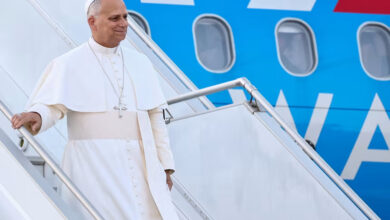Navigating Lebanon’s political landscape can be an overwhelming undertaking. The small Arab nation—nestled between the Mediterranean Sea, Israel and Syria—struggles to maintain its label as the “Paris of the East” while still reeling from the bloody civil war that devastated the country from 1975 to 1990.
The following five books can help guide you through Lebanon’s civil war, its cultural and ethnic patchwork, and what its future might hold.
"The Ghosts of Marty’s Square: An Eyewitness Account of Lebanon’s Life Struggle" by Michael Young (Simon and Schuster, 2010)
“We were kept awake by the Israeli jets at night; we heard the heavy bombs landing on Hezbollah’s ‘security perimeter,’ the party’s sanctum sanctorum in the Haret Hreik Beirut’s southern suburbs as if they were next door,” Young writes. “We faced the power cuts and wondered where on earth Lebanon was heading.” Lebanese-American Michael Young exposes a Lebanese population grappling with an identity crisis and fending off warfare in this meticulous account of the modern Lebanese political landscape. Young escorts the reader through the Lebanese political scene beginning with the 2005 assassination of former Prime Minister Rafik al-Hariri and pushing well into 2009. Both a personal narrative and an objective account of political developments, Young leads the reader through the 2005 liberal uprising termed the Cedar Revolution and the 2006 Israeli war with Hezbollah, as well as the evolution of the Hariri tribunal and the return of war criminals to Beirut’s parliamentary doorstep.
"From Beirut to Jerusalem" by Thomas Friedman (Anchor, 1990)
“It was the start of the nearly ten-year journey through the Middle East that is the subject of this book. It began, as it ended, with a bang.” These are the opening words offered by three-time Pulitzer Prize-winning author and journalist Thomas Friedman in this widely acclaimed masterpiece. Friedman first arrived at the international airport in Beirut in 1979 and the sight of the terminal’s bullet-ridden façade gave a reality check to the journalist whose life-long aspiration was to be a war correspondent. But Friedman soon shed his fears and got to work. In this book, he reveals a vivid portrayal of the belly of the war years. He departs for Jerusalem in 1984 but not before deftly analyzing economy of conflict, avoiding the rough on Beirut’s golf course because of landmine reports, and registering first hand accounts of the 1982 Israeli invasion and the Sabra and Shatila massacres. "From Beirut to Jerusalem" is a self-investigation and an expose on the Middle East and war.
"Hezbollah: A Short History" by Augustus Richard Norton (Princeton University Press, 2007)
Though dry and impersonal, Norton’s straightforward history of both Hezbollah and Shi’ism in Lebanon is unrivaled for the information it provides. With Shia power on the rise not only in Lebanon but throughout the Arab World, this account of the evolution of arguably the most successful Islamist organization today is of extreme value. Vast knowledge and experience seep through the words of this relatively quick read as Norton exposes the psychology of the Shia identity in Lebanon, which can be traced directly to contemporary developments.
"Pity the Nation: The Abduction of Lebanon" by Robert Fisk (Nation Books, 2002)
First published in 1990, there is no literature on the Lebanese civil war more comprehensive. Robert Fisk has been challenged in the media and by his readership for both skewing facts and pressing an Arab bias, but this book is undeniably a work of informative art. Fisk arrived in Beirut in 1976 on the heels of the Christian Phalangist militia’s first foray into PLO strongholds in southern Beirut—a seminal move marking the beginning of the incessant warfare that would follow. When the PLO left Beirut in 1982 under UN supervision, Fisk was there. When the wave of abductions of Westerners hit the city in the mid eighties, Fisk sped to work each day at 140kph. When Christian Michel Aoun was ousted from the presidential palace in 1990 and the Lebanese civil war officially came to a close, Fisk saw it first hand. “This was not my war. It never had been. I had see evil among the Arabs as well as the Israelis. I had seen carnage on an unprecedented scale, wreaked by Arab dictators as well as ruthless Israelis,” Fisk writes. “I had stayed on in Lebanon to witness history.”
"Mirror of the Arab World: Lebanon in Conflict" by Sandra Mackey (Norton, 2008)
“Until Iraq took a share of the title in 2003,” Mackey writes, “the most tormented of all Arab countries was Lebanon.” A renowned author of several books on Middle Eastern culture, politics and warfare, Mackey delivers a masterfully accessible account of both the Lebanese and Middle Eastern political landscapes. She deftly weaves the two together in a way only possible with the insight of an experienced and intimately knowledgeably Middle Eastern scholar. Mackey ushers the reader through Lebanon’s post-independence history, shedding a comprehensive—albeit sometimes less than meticulous—light on the Arab country, which she describes as straddling the border between East and West. "Mirror of the Arab World" is an umatched launch pad into understanding the Middle East.



